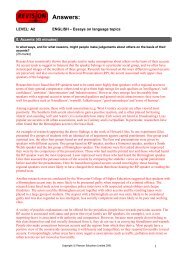The Dove Campaign for Real Beauty - Pearson
The Dove Campaign for Real Beauty - Pearson
The Dove Campaign for Real Beauty - Pearson
Create successful ePaper yourself
Turn your PDF publications into a flip-book with our unique Google optimized e-Paper software.
Chapter 2 Sustainable marketing: marketing ethics and social responsibilityactions, they might be ineffective as marketing managers and unhappy because of the constantmoral tension. Managers need a set of principles that will help them figure out the moralimportance of each situation and decide how far they can go in good conscience.But what principle should guide companies and marketing managers on issues of ethics andsocial responsibility? One philosophy is that such issues are decided by the free market and legalsystem. Under this principle, companies and their managers are not responsible <strong>for</strong> makingmoral judgements. Companies can in good conscience do whatever the system allows.A second philosophy puts responsibility not in the system, but in the hands of individualcompanies and managers. This more enlightened philosophy suggests that a company should havea ‘social conscience’. Companies and managers should apply high standards of ethics andmorality when making corporate decisions, regardless of ‘what the system allows’. Each companymust work out a philosophy of socially responsible and ethical behaviour. Under the societalmarketing concept, each manager must look beyond what is legal and allowed, and developstandards based on personal integrity, corporate conscience and long-run consumer welfare.A clear and responsible philosophy will help the company deal with the many knotty questionsposed by marketing and other human activities.A clear and responsible philosophy will help the company deal with knotty issues such as theone faced recently by 3M:In late 1997, a powerful new research technique <strong>for</strong> scanning blood kept turning up thesame odd result: tiny amounts of a chemical 3M had made <strong>for</strong> nearly 40 years were showingup in blood drawn from people living all across the country. If the results held up, it meant thatvirtually everyone may be carrying some minuscule amount of the chemical, calledperfluorooctane sulfonate (PFOS), in their systems. Even though at the time they had yet to comeup with a definitive answer as to what harm the chemical might cause, the company reached adrastic decision. In mid-2000, although under no mandate to act, 3M decided to phase outproducts containing PFOS and related chemicals, including its popular Scotchgard fabricprotector. This was no easy decision. Since there was as yet no replacement chemical, it meanta potential loss of about €400m in annual sales. 3M’s voluntary actions drew praise fromregulators. ‘3M deserves great credit <strong>for</strong> identifying the problem and coming <strong>for</strong>ward,’ says anEnvironmental Protection Agency administrator. ‘It took guts,’ comments another governmentscientist. ‘<strong>The</strong> fact is that most companies . . . go into anger, denial, and the rest of that stuff.[We’re used to seeing] decades-long arguments about whether a chemical is really toxic.’ For3M, however, it wasn’t all that difficult a decision – it was simply the right thing to do. 41In searching <strong>for</strong> ethical standards <strong>for</strong> marketing, marketing managers may also draw uponpostmodernist thinking and philosophies that date back well beyond marketing itself. <strong>Real</strong>Marketing 2.2 introduces some of this. As with environmentalism, the issue of ethics providesspecial challenges <strong>for</strong> international marketers. Business standards and practices vary a great dealfrom one country to the next.Imagine you are trying to win a big public contract in a developing country. <strong>The</strong> minister incharge makes unmistakable references to the disgracefully low pay of local civil officials and thebenefits his own children would enjoy if they could study abroad. <strong>The</strong> cost of providing this(concealed as a ‘scholarship’ paid <strong>for</strong> by your company) is minute compared with the value of thecontract. Your competitors, given the chance, would assuredly find the money. Do you pull out,or pay up? Most businesspeople in such situations find that their scruples are soon swallowed. Sodo most governments.103
















